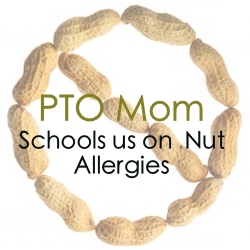Welcome to the NEW food allergy advice column, Get “Schooled” on Food Allergies with PTO Mom.
Thank you all for all of your “food allergies in school” questions!
Normally, I would be posting several “Q & A’s” however, since I received several “personal” questions on the topic of entering kindergarten, so I decided to answer them all at once.
Q: My child is starting kindergarten in September. He is allergic to peanuts and walnuts. What do I need to do before the school year starts to make sure he will be safe next school year? – Megan K.
Add. Q: My daughter is entering school, for the first time, in the fall. The school is nut-free. Should I still make accommodations for her? – James L.
Add. Q: My son is allergic to peanuts, but advised to avoid all nuts. He is in kindergarten right now, but he is a little behind so we have decided to hold him back and have him do another year of kindergarten. Should I have a meeting with the staff like I did for this school year or isn’t that needed? – Steph G.
I suggest calling the school to schedule an informal meeting with any staff members (principal, nurse, school counselor and/or school social worker) to discuss your child’s nut allergies. This meeting should happen every year, to refresh everyone’s memory and to change any accommodations that weren’t working for your child in the previous school year.
Before the meeting, figure out what your “goal” for your child is for the upcoming school year. Type it up or write it down so you know exactly what to discuss during the meeting. Note suggestions such as: allowing him/her to have a “safe bag” filled with snacks to be kept in the classroom and also allowing your child to carry and EpiPen. Even if the school is nut-free, you can never be to careful. It is better to have precautions put in place. Personally, I don’t like the idea of “nut-free classrooms” or “nut-free schools” because it gives a false sense of security. My son’s school is “Peanut-free”, unfortunately however, foods containing nuts, make it into the building sometimes. So in the end it is best to be overly cautious.
Be sure to have an “Allergy Action Plan” for your child. These are forms are usually provided by the child’s allergist or pediatrician. You can also have the doctor write out special requests on the “Allergy Action Plan” such as a “nut-free table” in the cafeteria or requesting to self carry and EpiPen. You can print a FREE “Allergy Action Plan (provided by the Food Allergy & Anaphylaxis Network) HERE.
Most of the time, a simple written management plan with the school nurse, principal and teacher is enough for the parents and the school to feel the child is safe and protected during school hours. If the school is willing to work with you then this is a good option for you to manage your child’s allergies in school. Communication is the key!
School is where children can learn to thrive on their own. Teach your child to be proud of who they are; not ashamed of it. It will show them, and others, that just because they happen to have an allergy to certain foods doesn’t mean that they are less than anyone else. They can still have fun at school, make friends and enjoy life!
Have a question regarding Peanut, Tree Nut or Other food allergies in school? Want to suggest a topic for me to discuss? Follow Me on Facebook @ www.facebook.com/ptomom or Contact me @ pto_mom@aol.com and follow my Inspiredeats column here.
Get “Schooled” on Food Allergies With PTO Mom!
*All information on this page is not to be taken instead of medical advise.*
